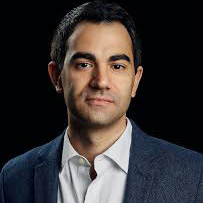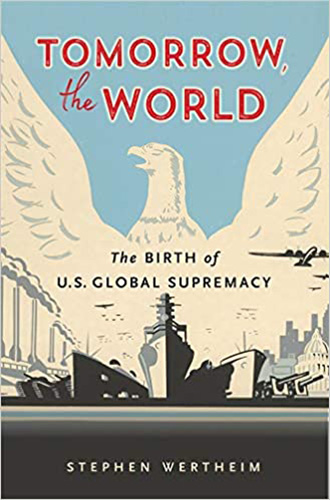Interview with Stephen Wertheim


Stephen Wertheim
author of "Tomorrow, the World, The Birth of U.S. Global Supremacy"

Michael Carter
Co-Host
Stephen Wertheim, author of "Tomorrow, the World, The Birth of U.S. Global Supremacy"
Stephen Wertheim's Website
Stephen Wertheim is a historian of the United States in the world and analyst of contemporary American grand strategy. He is a Senior Fellow in the American Statecraft Program at the Carnegie Endowment for International Peace. He is also a Visiting Faculty Fellow at the Center for Global Legal Challenges at Yale Law School.
He specializes in U.S. foreign relations and international order from the late nineteenth century to the present. In his book, Tomorrow, the World: The Birth of U.S. Global Supremacy (Harvard University Press, 2020), he reveals how U.S. leaders made a sudden decision to pursue global military dominance, which they had previously regarded as unnecessary at best and imperialistic at worst.
Stephen regularly writes about current events. His essays have appeared in Foreign Affairs, Foreign Policy, The Guardian, The Nation, The New York Review of Books, The New York Times, The New Yorker, The Washington Post, and elsewhere. In 2020, Prospect magazine named him one of “the world’s 50 top thinkers for the Covid-19 age.”
Stephen has also published scholarly articles on U.S. ideas and projects of diplomatic engagement, international law, world organization, colonial empire, and humanitarian intervention. His research on the intellectual origins of the League of Nations won the Fischel-Calhoun Prize from the Society for Historians of the Gilded Age and Progressive Era.
Before coming to Carnegie, he was Director of Grand Strategy at the Quincy Institute for Responsible Statecraft, a think-tank he co-founded in 2019. He was previously a Visiting Assistant Professor in history at Columbia University and a permanent Lecturer in history at Birkbeck, University of London. He has also been a Research Scholar at the Saltzman Institute of War and Peace Studies at Columbia University, a Junior Research Fellow at King’s College, University of Cambridge, and a Postdoctoral Research Associate in Values and Public Policy at Princeton University.
For most of its history, the United States avoided making political and military commitments that would entangle it in European-style power politics. Then, suddenly, it conceived a new role for itself as the world’s armed superpower―and never looked back. In Tomorrow, the World, Stephen Wertheim traces America’s transformation to the crucible of World War II, especially in the months prior to the attack on Pearl Harbor. As the Nazis conquered France, the architects of the nation’s new foreign policy came to believe that the United States ought to achieve primacy in international affairs forevermore. Scholars have struggled to explain the decision to pursue global supremacy. Some deny that American elites made a willing choice, casting the United States as a reluctant power that sloughed off “isolationism” only after all potential competitors lay in ruins. Others contend that the United States had always coveted global dominance and realized its ambition at the first opportunity. Both views are wrong. As late as 1940, the small coterie of officials and experts who composed the U.S. foreign policy class either wanted British preeminence in global affairs to continue or hoped that no power would dominate. The war, however, swept away their assumptions, leading them to conclude that the United States should extend its form of law and order across the globe and back it at gunpoint. Wertheim argues that no one favored “isolationism” ―a term introduced by advocates of armed supremacy in order to turn their own cause into the definition of a new “internationalism.” We now live, Wertheim warns, in the world that these men created. A sophisticated and impassioned narrative that questions the wisdom of U.S. supremacy, Tomorrow, the World reveals the intellectual path that brought us to today’s global entanglements and endless wars.